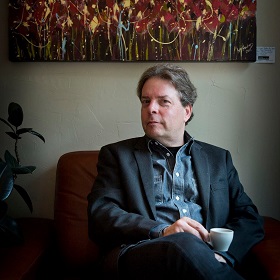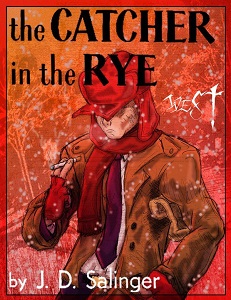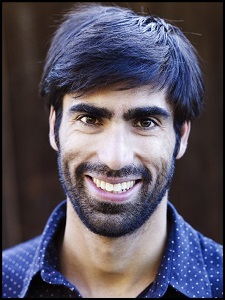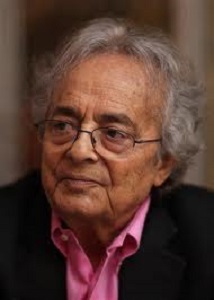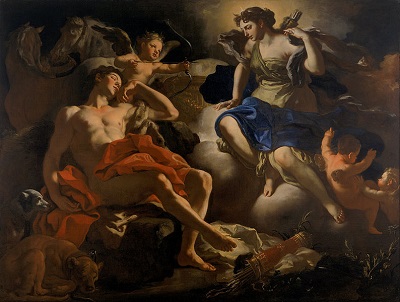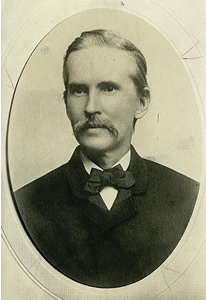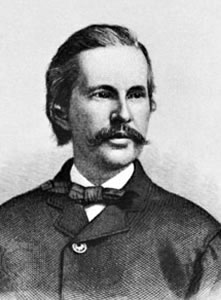De Nederlandse schrijfster Carry van Bruggen (eig. Caroline Lea de Haan) werd geboren in Smilde op 1 januari 1881. Zie ook alle tags voor Carry van Bruggen op dit blog.
Uit: De vier jaargetijden
“Nu hoort ze die niet meer, hier in de achterkamer, maar ze weet en voelt hun naderen, en juist terwijl ze denkt: nu moeten ze vlak bij zijn, nu moeten ze er zijn, juist op datzelfde oogenblik slaat Vader zijn hand aan den knop en nu komen ze in de gang -, Vader, de jongens en de Vreemde, dien ze meebrengen uit Sjoel.
‘Hoort u nu wel, Moeder?’
Zeker, duidelijk! Maar Moeder heeft er toch ook niet aan getwijfeld. Om dezen tijd moest het immers zijn. Reeds weken geleden verschenen in het Joodsche Familieblad de eerste berichten en al gauw werd er toen ook door de gewone kranten melding van gemaakt -, en naderhand hoorde je op de Sabbath-visites na de middagsjoel over niet anders meer praten … En ’s avonds in bed, dan zag je het allemaal voor je gesloten oogen, die nat en koud van afgekoelde tranen waren -, je zag ze loopen, de weggejaagden, de beroofden, de verstootenen -, in die wereld, die je maakt van wat je hoort en leest en die zich opent als je oogen dichtgaan, zag je ze als kleine, donkere, kromgebogen poppetjes. Je zag de donkere wegen als vegen, de wilde bosschen als klompen, de groote verlaten meren als glimpen … en het leek altijd op dingen die je bij dag had gezien, maar somberder, grooter en vermeerderd met alles wat Vader voorlas uit de krant.
‘Wouden en moerassen’ … en stoppelvelden, waar eenmaal koren stond. En uit alle woorden, die hetzelfde zeggen van dwalen en zwerven, van eenzaam en dakloos zijn, koos je altijd het woord ‘dolen’, omdat malle Sientje Prijs altijd spreekt van de ‘dole hoeken’ waarmee ze het verste deel van den dijk om de Oosterpias bedoelt, waar het zoo somber en verlaten is.”
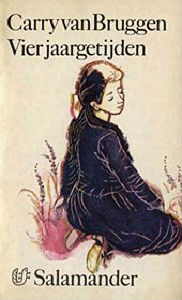
Carry van Bruggen (1 januari 1881 – 16 november 1932)
Cover
De Amerikaanse dichter Paul Hamilton Hayne werd geboren in Charleston, South Carolina, op 1 januari 1830. Zie ook alle tags voor Paul Hamilton Hayne op dit blog.
Baby’s First Word
We watched our baby day by day,
With earnest expectation,
To hear his infant lips unclose
In vague articulation.
But weeks, nay weary months, passed on;
His last wee tooth had broken
From rosy gums, yet not a word,
Not one had baby spoken.
‘O Rol!’ I cried, ‘it cannot be
A child so quick and clever,
Who hears (’tis plain he hears our talk),
Should thus stay dumb forever!’
Rol answered sharply, vexed and red,
‘What wretched nonsense, Jenny!
I never could have dreamed, my dear,
You’ll prate like such a ninny!’
(Yes, that’s the term, I must confess,
By which, with judgment narrow,
He dared for once, just once, you know,
To call his ‘winsome marrow.’)
But what cared I? since as I live,
True as my name is Jenny,
From out the cradle clear and loud,
Came back the bad word ‘Ninny!’
Thence uprose baby all aglee,
His peaceful slumbers routed,
And thrice that naughty, naughty word
He spoke, nay, almost shouted!
Rol, glancing at my startled eyes,
His mirth could scarcely smother.
But oh! to think the rogue’s first word
Should thus abuse his mother!
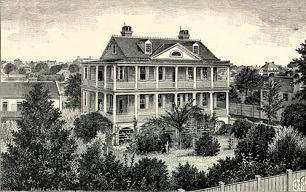
Paul Hamilton Hayne (1 januari 1830 – 6 juli 1886)
Hayne’s geboortehuis in Charleston, South Carolina
De Duitse schrijver en filosoof Rüdiger Safranski werd geboren op 1 januari 1945 in Rottweil. Zie ook alle tags voor Rüdiger Safranski op dit blog.
Uit: Goethe – Kunstwerk des Lebens
„Wann genau Goethe das Reiseziel Italien ins Auge gefaßt hatte, ist ungewiß. Am 12. Juli 1786, als er an Jacobi nach England schrieb, scheint er aber schon entschlossen gewesen zu sein: wenn du wiederkommst werde ich nach einer andern Weltseite geruckt sein. Heimlich trifft er seine Vorbereitungen, nur sein Sekretär und Vertrauter Philipp Seidel ist eingeweiht, nur er kennt den Namen, unter dem Goethe zu reisen beabsichtigt: Johann Philipp Möller. Unter diesem Namen wird er auch die Geldsendungen, die er sich nachschicken läßt, in Empfang nehmen. Warum die Geheimhaltung zuvor, warum das Inkognito? Es war riskant, abzufahren ohne vom Herzog einen längeren Urlaub erbeten zu haben, denn mit einer Abwesenheit von einigen Monaten rechnete er, ohne zu ahnen, daß sogar fast zwei Jahre daraus würden. Er wollte den Herzog nicht zuvor um Urlaub bitten, denn dann hätte er die Reise zur Disposition stellen und seine Entscheidung von der des Herzogs abhängig machen müssen. Das aber wollte er nicht. Er wollte alleine und für sich entscheiden. Es sollten Tatsachen geschaffen werden. Das Risiko, daß der Herzog mit Unwillen reagieren und ihn vielleicht sogar zurückrufen könnte, mußte er eingehen. Indem er in den Briefen von unterwegs keine Ortsangaben machte, sollte vermieden werden, daß ihn ein solcher Rückruf überhaupt erreichen konnte, ehe er in Rom war. Dort erst fühlte er sich in Sicherheit, denn er wäre dann weit genug weg. So dachte er, so plante er und so führte er es aus. Das Risiko war aber nicht nur der Rückruf. Der Herzog hätte ihm auch sein Vertrauen aufkündigen und ihn entlassen können. Es gibt in den Briefen an Freunde und Bekannte, auch aus späterer Zeit, keinen Anhaltspunkt dafür, daß Goethe diese Möglichkeit mit ihren katastrophalen, vor allem finanziellen Folgen ernsthaft ins Auge gefaßt hatte. Nur einmal wird sie dem Herzog gegenüber als mög liche Unmöglichkeit angedeutet: Versagen Sie mir ein Zeugnis Ihres Andenkens und Ihrer Liebe nicht. Einsam in die Welt hinausgestoßen wäre ich schlimmer dran als ein Anfänger, schrieb er ein Vierteljahr nach seiner Abreise, beunruhigt über das Schweigen des Herzogs. Sonst aber scheint Goethe sich bei ihm der Gefühle von Zutrauen, Wertschätzung und Anhänglichkeit ziemlich sicher gewesen zu sein. Doch eben nicht sicher genug, um auf den fast unterwürfigen Ton in den ersten Briefen aus Italien verzichten zu können. Man spürt den Wunsch, eine Unbotmäßigkeit vergessen zu machen.
Goethes Geheimhaltung seiner Reisepläne hatte also eine präzise Funktion.“
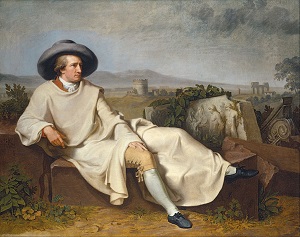
Rüdiger Safranski (Rottweil, 1 januari 1945)
Goethe in de Campagna door Johann Heinrich Wilhelm Tischbein, 1787
De Britse schrijver Joe Kingsley Orton werd geboren in Leicester op 1 januari 1933. Zie ook alle tags voor Joe Orten op dit blog.
Uit: Entertaining Mr Sloane
“SLOANE. I hit him several times.
KATH. You’re exaggerating. You’re not that type of young man. (Pause.) But don’t do it again Mamma wouldn’t like it. (ED enters.) Is he all right?
ED. Yes.
RATH. I’ll go up to him.
ED. He’s asleep.
KATH. Sleeping off the excitement, is he? (Exit.)
ED (taking SLOANE aside). How hard did you hit him?
SLOANE. Not hard.
ED. You don’t know your own strength, boy. Using him like a punchbag.
SLOANE. I’ve told you —
ED. He’s dead.
SLOANE. Dead? His heart.
ED. Whatever it was it’s murder, boy. You’ll have some explaining to do. (Lights a cigarette. KATH enters with a carpet sweeper, begins to sweep.)
KATH. I’d take up a toffee, but he only gets them stuck round his teeth.
ED. You’re not usually at a loss, surely? You can conjure up an idea or two.
KATH. Let Mr Sloane regain his composure, Ed. Let him collect his thoughts. Forget the incident. (She goes upstage, begins to hum ‘The Indian Love Call’.)
SLOANE looks at ED. ED smiles, shakes his head.
ED. That isn’t possible, I’m afraid.
KATH. He meant no harm.
ED. What are you doing?
KATH. My housework. I mustn’t neglect my chores.
ED. Can’t you find a better time than this?
KATH. It’s my usual time. Guess what’s for dinner, Mr Sloane.
SLOANE. I’m not hungry. ED. He doesn’t want any.”
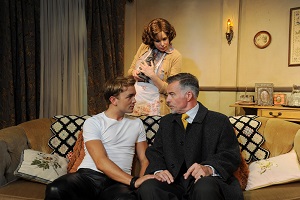
Joe Orton (1 januari 1933 – 9 augustus 1967)
Scene uit een opvoering in West Hollywood, 2011
De Mexicaanse schrijver en medicus Mariano Azuela González werd geboren in Lagos de Moreno op 1 januari 1873. Zie ook alle tags voor Mariano Azuela op dit blog.
Uit: The Underdogs (Vertaald door E. Munguia jr.)
“The ragged crew jumped to their feet, uttering shrill cries of joy; then their jubilation turned sinister and they gave vent to threats, oaths and imprecations.
“Of course, we can’t tell how strong they are,” said Demetrio as his glance traveled over their faces in scrutiny.
“Do you remember Medina? Out there at Hostotipaquillo, he only had a half a dozen men with knives that they sharpened on a grindstone. Well, he held back the soldiers and the police, didn’t he? And he beat them, too.”
“We’re every bit as good as Medina’s crowd!” said a tall, broad-shouldered man with a black beard and bushy eyebrows.
“By God, if I don’t own a Mauser and a lot of cartridges, if I can’t get a pair of trousers and shoes, then my name’s not Anastasio Montanez! Look here, Quail, you don’t believe it, do you? You ask my partner Demetrio if I haven’t half a dozen bullets in me already. Christ! Bullets are marbles to me! And I dare you to contradict me!”
“Viva Anastasio Montanez,” shouted Manteca.
“All right, all right!” said Montanez. “Viva Demetrio Macias, our chief, and long life to God in His heaven and to the Virgin Mary.”
“Viva Demetrio Macias,” they all shouted.
They gathered dry brush and wood, built a fire and placed chunks of fresh meat upon the burning coals. As the blaze rose, they collected about the fire, sat down Indian-fashion and inhaled the odor of the meat as it twisted on the crackling fire. The rays of the sun, falling about them, cast a golden radiance over the bloody hide of a calf, lying on the ground nearby. The meat dangled from a rope fastened to a huizache tree, to dry in the sun and wind.
“Well, men,” Demetrio said, “you know we’ve only twenty rifles, besides my thirty-thirty. If there are just a few of them, we’ll shoot until there’s not a live man left. If there’s a lot of ‘em, we can give ‘em a good scare, anyhow.”
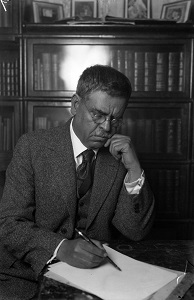
Mariano Azuela (1 januari 1873 – 1 maart 1952)
De Franse schrijver, essayist en vertaler René de Ceccatty werd geboren op 1 januari 1952 in Tunis. Zie ook alle tags voor René de Ceccatty op dit blog.
Uit: Raphaël et Raphaël
« Il me semblait impossible de passer pour le promeneur que j’étais, angoissé par la décision que j’avais prise de revoir le lieu où s’était produit, une cinquantaine d’années plus tôt, un événement qui pouvait encore déterminer mes rêves, mon corps, mes humeurs, ma pensée, ma vie. Et incertain sur l’issue de cette démarche. « Démarche » est en effet le terme administratif qui convient à mes raisonnements très volontaristes. Je faisais une « démarche » en marchant dans cette lumière orageuse. Parfois un flot de chansons orientales était vomi par une fenêtre où se balançait le tulle rose et doré d’un rideau, et un cri d’enfant en troublait la placide mélopée. Parfois un rire sec et grave d’homme rustre en soulignait le rythme soudain accéléré. Je croisai deux filles aux seins lourds et aux paupières luisantes : elles paraissaient, juchées sur leurs cothurnes à lanières d’argent et à hauts et larges talons de liège, devoir, à chaque pas, projeter leur corps tout entier d’un bord à l’autre du trottoir, ne cessant de perdre et de retrouver l’équilibre, par un jeu presque involontaire, soumis à leur poids, mais aussi à l’agitation de leurs mains, cliquetantes de bracelets et de bagues, et aux éclats de rire qui, dans leur souci exagéré d’expressivité, comme si elles avaient craint de ne pas être comprises l’une par l’autre, et comme si elles avaient convoqué un public imaginaire auquel j’étais le seul, en cet instant, à pouvoir donner une réalité, leur faisaient ouvrir démesurément la bouche, en lançant de courts rires stridents, suivis de raclements gutturaux de glaires et de petites toux théâtrales dans lesquelles elles cherchaient une ornementation raffinée. Que commentaient-elles ensemble qui leur faisait, à chaque pas, risquer la chute, mais, en l’évitant, leur donnait précisément le panache auquel cette mise en scène finalement savante aspirait ? Je laissai filer derrière moi ces deux caravelles qui abandonnaient au passage un parfum de menthe et de rose entêtante. Et, après leur éloignement, j’avais encore, imprimée sur ma rétine, telle une persistante fleur du vide, leurs visages jumeaux dont le front était barré d’une mèche noire plaquée, oblique et scintillante, comme si le gel dont elles l’avaient enduite était parsemé de strass. »
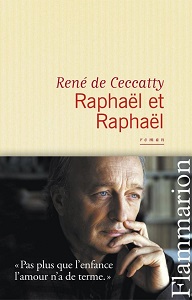
René de Ceccatty (Tunis, 1 januari 1952)
Cover
Zie voor nog meer schrijvers van de 1e januari ook mijn vorige blog van vandaag.

